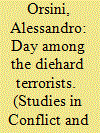|
|
|
Sort Order |
|
|
|
Items / Page
|
|
|
|
|
|
|
| Srl | Item |
| 1 |
ID:
137166


|
|
|
|
|
| Summary/Abstract |
This article contests the affirmation—based on common sense—according to which terrorists simply need courage. The typical terrorist act can be considered part of the sociological category known as “vile violence” that is the act of striking out at a victim after having placed him or her in a desperate situation that does not allow for any escape. This article is based on primary and secondary sources, such as the analysis of thirty-five homicides committed in Italy by six terrorist units of the extreme left; interviews with extreme left terrorists; interviews with victims of extreme left terrorists; autobiographies of extreme left terrorists; autobiographies of victims of extreme left terrorists; video interviews of extreme left terrorists; and written statements of the investigating magistrates.
|
|
|
|
|
|
|
|
|
|
|
|
|
|
|
|
| 2 |
ID:
120442


|
|
|
|
|
| Publication |
2013.
|
| Summary/Abstract |
This article describes the experience of a sociologist who made contact with a group of diehard terrorists responsible for multiple murders in order to conduct an ethnographic study. After outlining the sociological profile of the diehard terrorists, the author-making reference to the ethnographic studies of Jack Douglas, Martin Sanchez Jankowski, and Laud Humphreys-describes how he followed their traces. The aim of the article is to analyze the psychological costs that the sociologist must pay when he interacts with men and women who, in addition to proudly claiming credit for the homicides they have committed, affirm the importance of continuing to kill in order to salvage humanity's future.
|
|
|
|
|
|
|
|
|
|
|
|
|
|
|
|
| 3 |
ID:
122426


|
|
|
|
|
| Publication |
2013.
|
| Summary/Abstract |
The interview that follows was conducted somewhere in Italy with a militant of the Red Brigades recently freed after spending 32 years and 6 months in prison. Taking up the sociological perspective of Max Weber, the author draws a distinction between "professional terrorist" and "vocational terrorist". The terrorist by vocation differs from the professional terrorist in his profound faith in the mission he feels he must accomplish. He does not try to improve his social status and is not interested in the selfish pursuit of personal well-being. He gives up love, family, children and friendship. When he decides to join a terrorist group, he voluntarily severs any contact with his former life. He is a high school or university graduate and might choose a secure life and a good job but prefers to kill, accepting the risk of dying. The vocational terrorist is the terrorist in his incandescent state.
|
|
|
|
|
|
|
|
|
|
|
|
|
|
|
|
| 4 |
ID:
115355


|
|
|
|
|
| Publication |
2012.
|
| Summary/Abstract |
This article focuses on the role of ideology in the decision of people who are not from societies' worst-off socioeconomic groups to join a left-wing terrorist organization. Taking up the sociological perspective of Max Weber, Clifford Geertz, and Raymond Boudon, the author introduces the concept of the "terrorist of the first hour" and considers ideology as a type of social bond. The concept of ideology is here broken down into four dimensions: Social, Temporal, Affective, and Moral (STAM bond). This article also presents data on the ages, sex, educational level, and occupation of the Italian people arrested (2,730) or convicted (528) for crimes of terrorism from 1970 to 2011. Data on Italian terrorists were provided by the General Department of Prisoners of the Ministry of Justice.
|
|
|
|
|
|
|
|
|
|
|
|
|
|
|
|
| 5 |
ID:
189336


|
|
|
|
|
| Summary/Abstract |
Thousands of monographs, reports, and articles about radicalization have been published since 2001. With the passage of time, the “scientific community” has come to identify some of them as “milestones.” Which are they? Unlike Anja Dalgaard-Nielsen, who wrote an article in 2010 on what we know and what we don’t know about violent radicalization in Europe, the author here aims to present and discuss what everybody should know about the process of becoming radicalized. This article has four aims. The first is to present and discuss the most influential theories of radicalization leading to terrorism. This author attributes the milestones in radicalization research to the following scholars: Fathali M. Moghaddam, Silber & Bhatt, Marc Sageman, John Horgan, Quintan Wiktorowicz, Lawrence Kuznar, Clark McCauley, Sophia Moskalenko, Donatella della Porta, Arie W. Kruglanski, Jocelyn J. Bélanger, and Rohan Gunaratna. The second aim is to highlight the contribution of sociology, as an academic discipline, to the study of radicalization. To that end, the process of radicalization has been conceptualized here as a process of socialization or, more precisely, resocialization. The third aim is to present the DRIA Model of radicalization that is based on the lives of thirty-nine jihadi terrorists who succeeded in carrying out terror attacks in the West between 2004 and 2018. The fourth aim is to contribute to the debate over the “stagnation” – real or presumed – in radicalization research.
|
|
|
|
|
|
|
|
|
|
|
|
|
|
|
|
|
|
|
|
|